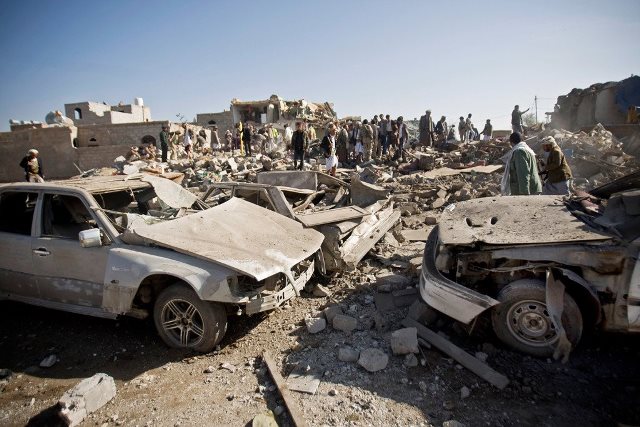As the horrific death toll of civilians mount in Yemen, Saudi Arabia unmoved carries on bombing raids with no end in sight. Yet all indications are that the aerial bombardment of Houthi positions is a dismal failure and calls into question Saudi’s plan for Yemen. Houthi forces have advanced into Yemen’s second largest city Aden, and are making gains elsewhere. Iran the backer of Houthis and buoyed by the recent nuclear agreement brokered by America has sent two warships to the Gulf of Aden, only to complicate matters further. Meanwhile, Saudi Arabia unrepentant continues to demand extra troops from Turkey and Pakistan to bolster the troops of the coalition for a possible ground invasion, which looks ever more likely.
What is extraordinary about the conflict in Yemen is how quickly Muslim countries have mobilized to commit military assets to the disposal of the Saudi’s to restore Hadi’s rule in Yemen. Kuwait, Bahrain, Qatar, UAE, Morocco, Sudan, Egypt, and Jordan have all contributed to the Saudi led campaign. Even Pakistan, which is hesitant about sending troops for a possible ground invasion has committed military assets to protect Saudi’s territorial integrity.
The question arises, as to why this political will was absent when the Jewish State pulverized Gazans in 2009 or when Assad began the brutal extermination of his people in 2011. The same can be said of other conflict zones such as Libya, Somalia, Iraq, and Afghanistan. Will such a force be used to liberate Rohingyan Muslims form the oppression of Myanmar’s ruthless persecution or intervention in Kashmir to protect Muslims from the despotic rule of Hindus? Obviously, the answer is No.
For decades now, the rulers of the Muslim world gave lame excuses when it came to fighting the Jewish state to liberate Palestine or intervening in Muslim disputes like the Iraq-Iran war in the 1980s or Iraq’s annexation of Kuwait in 1990. They always preferred to seek the assistance of America and the West to interfere in such conflicts. In this way, they sought to appease their domestic populations. However, today’s assembly of Muslim forces under the leadership of Saudi Arabia marks the beginning of new era but one that is both extremely dangerous as well as full of anticipation and hope for the Muslim masses.
America and the West, exhausted by the wars in Iraq and Afghanistan can no longer commit to substantial ground troops to preserve the precarious political order they painstakingly established throughout the Muslim world. West’s secular political hegemony is not only unravelling in Libya, Syria, Iraq, Somalia, Afghanistan and Yemen, but also is leaving behind political vacuum, which is quickly filled by Islamic militants opposed to West’s liberal values.
The unstitching of the Middle East’s political landscape coupled with the West’s decline is heralding a new episode in the history of the Muslim world, where rulers of the GCC and other Islamic countries are acting under the auspices of the West to provide Muslim troops to subdue Muslim populations opposed to the existing political order. The plan is for America and the West to provide weapons and technical logistics to Muslims armies to spearhead the fighting in trouble spots.
This is a desperate act and appears to be the last throw of the dice before a new political order emerges. This is because security forces in the Arab and the wider Muslim world are already overstretched in fighting the re-emergence of political Islam at home, and now they are being dragged into subduing Muslim populations in other parts of the Muslim world. Such acts will not only further alienate the Muslim masses from their leaders, but also make it difficult for the West to sell their ideology and values to Muslims.
To many Muslims the current developments might appear extremely disheartening, as they feel suffocated from all directions and unable to practice their Islam. However, they should not lose hope, as the current situation in the Muslim world resemble a paradox. On the one hand Muslims feel oppressed by the forces of evil, and on the other hand Islam grows stronger by the day. The intensity of this paradox will usher in a new era and bestow the Muslim ummah with victory from Allah سبحانه وتعالى.
مَسَّتْهُمُ الْبَأْسَاءُ وَالضَّرَّاءُ وَزُلْزِلُوا حَتَّى يَقُولَ الرَّسُولُ وَالَّذِينَ آَمَنُوا مَعَهُ مَتَى نَصْرُ اللَّهِ أَلَا إِنَّ نَصْرَ اللَّهِ قَرِيبٌ
“Misfortune and hardship befell them, and so shaken were they that the apostle, and the believers with him, would exclaim, “When will God’s help come?” Oh, verily, God’s help is [always] near!”
(Al-Baqara: 214)
Written for the Central Media Office of Hizb ut Tahrir by
Abdul Majeed Bhatti

